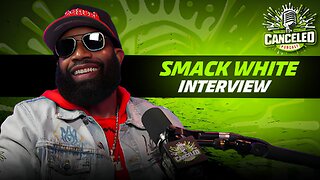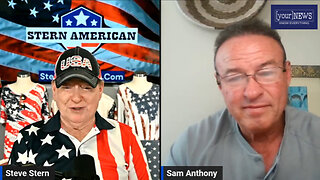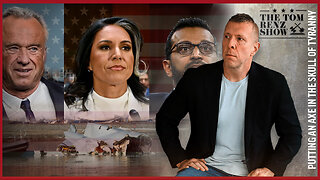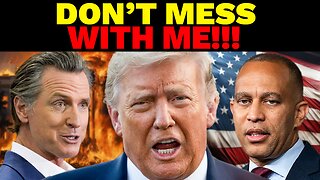Premium Only Content

Aleister Crowley Aapologist, Evil is Not Bad
the mystical societies Aleister Crowley founded were simply pretexts for him to take as many drugs and have as much sex as he could, he was a second-rate writer at best
when the novelist Arthur Calder-Marshall said he had gone ‘from Great Beast to Great Bore’, I thought it a fair summing-up.
Crowley initiates were some of the dodgiest people in the western world – either frauds or hucksters themselves or the most gullible of fools.
There was always the matter of his self-reinvention.
Aleister Crowley was not christened thus: he changed his first name because he thought that a dactyl followed by a spondee conferred the greatest chance of becoming famous.
And yet a powerful magus does not end his days in Hastings. (Sorry, Hastings.) So even though Crowley exerts a pull to this day, and not only on the credulous, I had only a mild curiosity about this book to start with.
I am not sure my expectations have ever been so out of joint with the reality. Dipping at random, I found this, under the entry for ‘Café Royal, Regent Street’: ‘On another occasion Crowley is alleged to have entertained a party of guests royally, excused himself to go to the gents, and absconded down Regent Street in a taxi, dodging the bill.’
It’s all fun and games, just about, until we get to page 109 and his encounter with Leah Hirsig
Leave aside that, as I read more of the book, it became clear that this was pretty much the archetypal Crowley story, confirming, in a sentence, at least one of the misgivings I had about the man – of course he would do that – but look at the word ‘alleged’. Crowley has been dead for seven and a half decades: he is not going to sue. But Phil Baker is a scrupulous writer, and if he can’t get chapter and verse on an incident he’s not going to pretend he has.
Most popular
Steerpike
Why Alison Rose had to quit as NatWest chief
Anyway, Crowley provided us with enough material for most of Baker’s work to consist of reporting verified fact (along with a useful and well-judged commentary).
And here’s what Crowley could come up with – ‘The Most Holy, Most Illustrious, Most Illuminated and Most Puissant Baphomet, X degree, Rex Summus Sanctissimus 33 degree, 90 degree, 96 degree, Past Grand Master of the United States of America, Grand Master of Ireland, Iona’ – and you can only speculate on how anyone could believe that these self-proclaimed titles meant anything, even if Crowley himself did.
In the end I don’t think it matters. There was plenty of this stuff around at the time. W.B. Yeats (who hated Crowley) was mixed up in it too; a hodge-podge of half-baked, pseudo-religious imagery and bad Latin which Crowley used in order to find sexual partners and pay for his drug habit – cocaine and heroin mainly.
The fine dining can’t have been cheap either, but to Crowley’s credit he had a knack of being paid for by whoever he was with at the time, when he wasn’t (allegedly) doing a runner from the restaurant itself.
His London was largely centred on an area encompassing the western end of Piccadilly and Soho.
There were offshoots in Fulham and Hampstead, but this was his preferred stamping ground. He was something of a gourmet and particularly fond of exotic foods such as Chinese or curry; but he was equally happy with oysters and lobsters, and who isn’t?
These details humanise him; they declaw the Beast. I was particularly touched that he often ate at Chez Victor, as did I; in fact, I wooed my wife-to-be there. If there is one thing to mourn above all that has gone from London it is the good restaurant that you can actually afford.
So what we have here is a portrait of London from the early 20th century to the 1940s, with gaps occurring during the intervals Crowley lived abroad (in the USA during the first world war, or Cefalù, in Sicily, in the 1920s). Much of that world has vanished, but there are still traces; and in some instances (the French House and the Dog and Duck in Soho) the places are unchanged, more or less.
It is all fun and games, just about, until we get to page 109 and his encounter with Leah Hirsig (‘Alostrael’). I shall spare you the details of what he got up to, or claimed to have got up to, with her. Suffice it to say that Baker makes this comment:
‘Trying to have sex with a goat (after which Crowley cut its throat) seems innocuous enough’ by comparison. ‘It doesn’t sound either allegorical or pure fantasy,’ he adds, of Crowley’s account.
Aleister Crowley and inventor Nikola Tesla traveled in similar circles but never met. What might have happened if they had?
Aleister Crowley (1875-1947) was an iconic English poet and occultist whose influence in popular culture extends to comics, songs, and album covers. He is seen by some as a great and groundbreaking spiritual revolutionary; by others, as a notorious Satanist once dubbed “the wickedest man in the world.” Nikola Tesla (1856-1943): the equally iconic Serbian-American inventor, is also a staple of popular culture. He was famous for innovations and concepts that have helped shape the modern world such as alternating current, hydroelectricity, and remote-controlled vehicles.
Like Crowley, Tesla’s legacy is not without controversy. Lauded by many as a genius far ahead of his time, others see his achievements as grossly exaggerated, and the rhetoric can at times seem downright partisan.
If you knew both of these guys, wouldn’t you try to get them together?
In the early 20th century, New York poet, journalist, and magazine editor George Sylvester Viereck (1884-1962) was a mutual acquaintance of Crowley and Tesla. Indeed, Viereck knew both men well, yet there’s no record that he ever introduced them, even by correspondence.
While it was in the interwar period that Viereck and Tesla became especially close, Tesla biographer Marc J. Seifer notes in his book Wizard: The Life and Times of Nikola Tesla that the poet and the inventor had long been connected through Robert Underwood Johnson, editor of The Century Magazine, who began publishing “such provocative Viereck poems as ‘The Haunted House’” in 1906.
Johnson was also a close friend of Tesla’s beginning in the 1890s. Seifer (whose new Tesla biography, Tesla: Wizard at War, is forthcoming) places the beginning of Tesla and Viereck’s personal association at least as early as World War I (1914-1918).
It was also during World War I that Viereck and Crowley began a working relationship. Crowley was living in New York and wrote for Viereck’s pro-German magazine The Fatherland, then later for Viereck’s literary magazine, The International, where Crowley served as an editor and contributed many poems, essays, and short stories under his own name as well as pseudonyms.
Who was George Sylvester Viereck?
The man who formed the link between Crowley and Tesla was born in Munich in 1884. Reputedly the grandson of Kaiser Wilhelm I through the out-of-wedlock birth of his father, George Sylvester Viereck emigrated to the US in 1897. He displayed literary aspirations from a young age, and by his early 20s was publishing poetry. He soon attained literary fame, and by 1909 was, in Seifer’s words, “the latest rising star in the world of poetry.”
Presumably influenced by his German heritage, after the Great War had broken out, Viereck became alarmed at the prospect of US intervention on behalf of the Entente Powers. Seifer describes Viereck’s assessment of the situation and the course of action he decided upon.
George Sylvester Viereck, the country’s leading poet, colleague of [Robert Underwood] Johnson, and Tesla friend, began to sense the growing shift away from [American] neutrality…
…Having just returned from Berlin and the midst of a war, Viereck courted Teddy Roosevelt and emissaries of President [Woodrow] Wilson. Simultaneously, he began a new publication with other leading German Americans. Initially welcomed by the press, the Fatherland soon achieved a subscription base of 100,000.
Viereck, convinced Germany was in the right, hoped for no American intervention against the Central Powers. Exploiting his literary stardom to petition political leaders shows just how intense this desire was, and The Fatherland was his main device to achieve it. Into this political maelstrom entered Aleister Crowley.
Aleister Crowley: Secret Agent
Crowley arrived in New York, appropriately enough, on Halloween 1914. A prolific writer of poetry, fiction, and essays, his work began appearing in Vanity Fair as well as Viereck’s The Fatherland, where Crowley pushed for a hardline editorial stance in favor of Germany. Crowley has since then been denounced as a traitor to his country; it’s been argued that he was, in fact, acting to covertly undermine German propaganda efforts in America by expressing views he hoped would be seen as both pro-German and beyond the pale. However, his attempts to gain official support from British intelligence met with a lukewarm response, and he was, as Crowley biographer Tobias Churton puts it, engaged in “a semi-freelance effort to wage war against Germany on American soil.” In his book Aleister Crowley: The Biography, Churton notes:
Crowley’s propaganda was of such extreme absurdity that it would a) suggest to ordinary intelligence that the Germans lacked common sense and decency, and b) that it could be used to enflame extreme acts among Viereck’s superiors.
It is thus possible that Crowley’s efforts contributed to Germany’s commencement of unrestricted submarine warfare, most famously the 1915 sinking of the British passenger ship Lusitania, as well as attacks on US transatlantic shipping, drawing the US into the war in 1917. This point is also explored in Churton’s Aleister Crowley in America as well as Richard B. Spence’s work on Crowley’s espionage activities, Secret Agent 666.
To further cement his public image as an anti-British radical, Crowley stood before the Statute of Liberty to declare Irish independence from the British Empire. During the same period, Crowley’s writings in Viereck’s literary periodical, The International, were largely devoted to advocating his views on spirituality and the occult. These included in particular Thelema, the religious philosophy he developed after a perceived encounter in 1904 with a spiritual entity he identified as “Aiwass”. Thelema is from the Greek for “will”, related to the famous Crowley phrase, “Do what thou wilt shall be the whole of the law.”
While this may strike one as a call to licentiousness and irresponsibility, for Crowley, it meant a spiritual journey to find one’s true will rather than simply doing whatever strikes one’s fancy at the moment. However difficult it is to reconcile this credo with Crowley’s own well-known indulgences (in drugs, for example), the extent and detail of his writings convey a picture of a sincere effort to comprehend a greater reality.
In 1919, with the Great War finally over, Crowley returned to England. He met Viereck again, in London, in 1936. They had lunch, and in an apparent effort by Crowley to repudiate talk of wartime treachery, Viereck agreed to sign an affidavit affirming that Crowley had gotten into no trouble with US authorities during the war. Shortly thereafter, Crowley wrote Viereck asking him to recommend to German Chancellor Adolph Hitler his The Book of the Law (the central text of Thelema supposedly dictated to Crowley by Aiwass) as a possible source of philosophical principles for Nazism.
Viereck had met Hitler several times, most recently in 1934. The next war with Germany was not yet a reality, and according to biographer Lawrence Sutin, for “the purpose of political influence for himself and for Thelema…Crowley never hesitated to explore all avenues.”
Was Crowley hoping Thelema could mitigate the effects of Nazism and avert war? Or was it, as Sutin implies, simply opportunism? Whatever the case, nothing came of this attempt, and from the start of World War II (1939-1945), Crowley supported the British war effort in earnest, his dealings with Viereck at an end.
Viereck and Tesla: A Friendship in the Shadow of Nazism
When Crowley arrived in New York in 1914, Tesla was already there. An ethnic Serb, in 1884 he emigrated from the region of the Austro-Hungarian Empire, which is now Croatia, and spent virtually the rest of his life living in Manhattan. After Crowley left in 1919, Tesla stayed, and his relationship with Viereck grew closer.
While Crowley and Viereck’s relationship was inherently political, Tesla and Viereck’s was not. Tesla strikes a more or less apolitical figure, and perhaps this was appealing to the poet, whose past as a pro-German agitator during the Great War didn’t stop Tesla from being his friend. This was true even as Viereck’s politics became more radical, embracing the tenets of Nazism, particularly after Hitler’s rise to power in 1933.
According to Seifer, Viereck attempted to rationalize Nazism by somehow ignoring its core element of racial supremacism:
Not an anti-Semite, having, for instance, co-written a series of books with a Jewish professor, Viereck, a lifelong German apologist, was nevertheless somehow able to rationalize the Nazi spiel, and he became an American spokesman for Adolph Hitler. Although [Viereck associate Sigmund] Freud saw in this journalistic “lion hunter” a great mind, he said that Viereck suffered from “narcissism, had delusions of persecution and a fixation on the Fatherland.” Once Viereck began to rationalize Hitler’s rhetoric, Freud saw the journalist as “debasing himself” and would not correspond with him anymore.
It might be shocking for some to know that one of Tesla’s closest friends was quite literally a Nazi, or at least sympathetic to the Nazi agenda. Tesla was somehow able to connect with Viereck in a way detached from considerations of ideology. The closest the inventor came to expressing any explicitly political views may have been in a 1937 interview conducted by his friend Viereck. Tesla is quoted as saying that sufficient advancements in technology might be a means to abolish war. In this same interview, he is quoted as favoring eugenics:
The trend of opinion among eugenists is that we must make marriage more difficult. Certainly no one who is not a desirable parent should be permitted to produce progeny. A century from now it will no more occur to a normal person to mate with a person eugenically unfit than to marry a habitual criminal.
This is another point admirers of Tesla might view with dismay and perhaps be tempted to suspect that Viereck, prone to Nazi apologetics, may have put words into the aging Tesla’s mouth. Margaret Cheney implies as much in her book Tesla: Man Out of Time. But while eugenics is today widely seen as morally reprehensible, in the early 20th century, it was openly advocated by such public figures as H.G. Wells, Winston Churchill, and Margaret Sanger. Without evidence that Viereck doctored the interview text, we have to assume this is what Tesla really said. We can refuse to excuse his support for eugenics while also recognizing that it was part of a widespread trend of the era and not mutually inclusive with Nazism.
Whatever Tesla thought about Viereck’s politics, past or present, he was fond of him personally and artistically. Cheney cites a letter from Tesla written in April 1934 praising Viereck as “the greatest poet of America”, insisting that he should desist from taking opium tincture, and expressing sympathy for his friend’s apparent financial difficulties (which, by then, Tesla was also experiencing).
Once America entered World War II, Tesla might presumably have taken a darker view of Viereck’s beliefs. However, Seifer notes that the inventor was by this time “becoming more feeble, lapsing in and out of states of coherence.” He was also subsisting on a diet of crackers while living at the New Yorker Hotel, where he was never able to pay his room fees. Tesla had other things to worry about than Viereck’s opinion of Hitler, and in any case, did not live to see the end of the war.
It was during World War II that Viereck ran into serious trouble. Already a marked man for his pro-German activities during the previous war, in 1942, he was convicted and imprisoned for failure to notify the US government that he was (again) essentially acting as a propagandist for Germany. He was released in 1947, the same year Aleister Crowley died of heart disease and bronchitis. Tesla had already passed on, alone and in poverty, succumbing to a heart attack in his room at the New Yorker Hotel in January 1943. Viereck died of a cerebral hemorrhage in 1962.
Speculation: Why Didn’t Viereck Introduce Crowley and Tesla?
Spence speculates that Crowley and Tesla may have been connected through Wardenclyffe Tower, Tesla’s experimental wireless transmission station near Shoreham, Long Island. Crowley went camping in nearby Montauk Point in the summer of 1918. Spence also hypothesizes that Crowley considered an attempt to meet Tesla through Viereck.
Although the inventor is not known to have waxed patriotic about his native land or Germany, he had long-standing business connections in Berlin and many Germans among his associates, including his personal secretary George Scherff, a close friend of Viereck. Tesla eventually befriended Viereck as well, having probably met him during WWI. Here was a source of information for Crowley, or even a pathway into Tesla’s circle.
In connection with this, Spence suggests that Crowley may have accessed Wardenclyffe Tower for clandestine communication with Berlin in his capacity as a double agent for Britain. However, as physicist and AI specialist Daniel C. Elton points out, the tower was, unfortunately, a failure.
[The] trial runs of the facility yielded no meaningful results, other than scaring the neighbors with flashes of electrical streamers. Tesla’s estimated costs for the completion of the project ballooned from $1 million to $2 million as he increased the number of steam turbine generators he thought necessary for the system to work. With no meaningful results to show, investors turned Tesla down, preferring to invest in technologies that had been proven, such as radio.
So even if Crowley had met Tesla (or an intermediary), and attempted to use Wardenclyffe Tower as a means of communication, whether he would have succeeded remains questionable. Moreover, whatever the extent of Crowley’s espionage role during World War I, there’s no record of him claiming to have encountered Tesla, either socially or “professionally”.
That said, Viereck must have been aware of the military potential of Tesla’s knowledge. There had been, for example, the inventor’s demonstration of a radio-controlled boat at the 1898 Electrical Exhibition at Madison Square Garden. It was arguably the world’s first functional drone. Did Viereck imagine there might be other gadgets in the works Tesla had not spoken of? If he even slightly suspected Crowley of being a spy (or susceptibility to becoming one), it would make perfect sense to keep him away from Tesla. If the Americans remained neutral and Crowley and Tesla never met, it would at least reduce the possibility of Tesla’s talents being placed at Britain’s disposal.
To be sure, even if Viereck had been wary of such an outcome, then he likely overestimated the potential interest of the British government. The Americans, for their part, showed little enthusiasm for the new technology, and radio-controlled weaponry remained largely undeveloped until decades after Tesla’s death. Crowley probably would have seen trying to elicit official British interest as a waste of time. He may also have considered such an attempt too risky or perhaps saw “technology-poaching” as being outside his purview as a covert propaganda derailer. He was busy enough persuading the Germans to shoot themselves in the foot.
Even if Viereck had no such suspicions, he may have thought that Crowley and Tesla together would be the ultimate oil-and-water combination. Whatever the depth of his commitment to the study of magic (or magick, as he spelled it), Crowley was in his own way a libertine. His sexual promiscuity and drug use, particularly his cocaine and heroin addiction, are legendary. (“Sex magick”, or esoteric rituals in which sexual activity played the central role, was a common pursuit.)
Tesla, by comparison, was famously germophobic, a moderate drinker, and apparently celibate (he never married). He also avoided caffeine and tobacco, whereas Crowley wrote a prayer praising coffee and smoked a pipe. With so little in common, and much diametrically opposed, maybe Viereck thought Crowley and Tesla would have hated each other and didn’t want to risk antagonism from one or both of them. Since Crowley and Tesla must have been aware of each other’s existence, they both may have shared this view.
Still, a meeting of Crowley and Tesla would surely have been fascinating to witness, whatever the risk of the two not getting along (or maybe because of it). Who knows? Perhaps someday, someone will prove they actually met.
Works Cited
“Aiwass“. Wikipedia.
“Aleister Crowley”. Comic Vine.
“Aleister Crowley“. Wikipedia.
“Axis Agents: Safeguard for Viereck”. Time. 16 March, 1942.
Beyer, Catherine. “Understanding the Religion of Thelema”. Learn Religions.com. 27 January 2019.
“The Century Magazine”. The Online Books Page. University of Pennsylvania Library.
Cheney, Margaret. Tesla: Man Out of Time. Touchstone. 2001.
Churton, Tobias. Aleister Crowley in America. Inner Traditions. 2017.
—. Aleister Crowley: The Biography. Watkins Publishing. 2011.
Conner, Nicole. “Inside the home of the wickedest man in the world: Eerie photos show abandoned cottage of Satanist Aleister Crowley with occult pattern on floor and ‘why are you in my house?’ scrawled on the wall”. Daily Mail. 18 December 2020.
—. “Aleister Crowley in Vanity Fair“. The Hermetic Library.
—. Author page featuring various works. Internet Archive.
—. The Book of the Law. 1904. Internet Archive.
—. “Honesty is the Best Policy.” The Fatherland. Vol. I, no. 23, 13 January 1915 & Vol. I, no. 24, 20 January 1915. Access: Hermetic Library.
—. Invocation of Coffee from the diaries of Aleister Crowley. The Hermetic Library Blog.
“Debunking the Tesla Myth: False facts about Tesla giving him more credit than he deserves.” Edison Tech Center.
Elton, Daniel C. “Tesla’s Folly – why Wardenclyffe didn’t work.” Moreisdifferent.com. 22 February 2015.
The Fatherland. Villanova University Library.
“George Sylvester Viereck“. Wikipedia.
Inman, Matthew. “Why Nikola Tesla was the greatest geek who ever lived”. The Oatmeal. Undated.
The International. The International Monthly, Inc. Vol. XI, No. 10, October 1917. Access: Harvard Library website.
Knapp, Alex. “Tesla, Eugenics And Rationalizing Dehumanization”. Forbes. 19 November 2012.
“Nikola Tesla“. Wikipedia.
“Nikola Tesla in Popular Culture“. Wikipedia.
“Ozzy Osbourne – Mr. Crowley (Lyrics)”. YouTube. Uploaded by Don Mac. 2 February 2018.
“Robert Underwood Johnson“. Wikipedia.
Sanger, Margaret. “The Eugenic Value of Birth Control Propaganda”. Birth Control Review. October 1921. p. 5. Access: New York University, “The Public Writings and Speeches of Margaret Sanger”.
Seifer, Marc J. Email Communication. 24 March 2021.
—. Wizard: The Life and Times of Nikola Tesla. Citadel Press. 1999.
—. Wizard at War: The Genius, the Particle Beam, and the Pursuit of Power. Citadel Press. publication pending.
“Sgt. Pepper – Meet the Band: Aleister Crowley”. BBC.
Spence, Richard B. Secret Agent 666: Aleister Crowley, British Intelligence, and the Occult. Feral House, 2008.
Sutin, Lawrence. Do What Thou Wilt: A Life of Aleister Crowley. St. Martin’s Griffin, 2000.
“Tesla Inside the Lab: Remote Control.” PBS.org. Undated.
Tesla, Nikola (as told to George Sylvester Viereck). “A Machine to End War.” Liberty. February 1937. Access: PBS.org.
“Thelema.” Wiktionary, The Free Dictionary.
“Top 11 Things You Didn’t Know about Nikola Tesla.” United States Department of Energy. 18 November 2013.
Urban, Hugh B. Magia Sexualis: Sex, Magic, and Liberation in Modern Western Esotericism. University of California Press, 2006.
Viereck, George Sylvester. “The Haunted House.” Poetry Archive.
“Wardenclyffe Tower.” Wikipedia.
“William I, German Emperor.” Wikipedia.
-
 2:17:02
2:17:02
Tundra Tactical
1 day ago $28.98 earnedTundra Nation Live : Shawn Of S2 Armament Joins The Boys
267K28 -
 23:22
23:22
MYLUNCHBREAK CHANNEL PAGE
2 days agoUnder The Necropolis - Pt 5
210K71 -
 54:05
54:05
TheGetCanceledPodcast
1 day ago $14.91 earnedThe GCP Ep.11 | Smack White Talks Smack DVD Vs WorldStar, Battle Rap, Universal Hood Pass & More...
202K35 -
 8:30
8:30
Game On!
20 hours ago $0.91 earnedLakers BLOCKBUSTER trade! Luka Doncic is coming to LA!
32.3K4 -
 48:29
48:29
hickok45
1 day agoSunday Shoot-a-Round # 266
30.7K10 -
 15:18
15:18
SternAmerican
3 days agoStern American with Sam Anthony from YourNews.com
21.3K1 -
 1:03:13
1:03:13
PMG
1 day ago $1.97 earnedRFK, Tulsi & Kash Hearings, the Plane Crash in the Potomic, & Ozempic
19.2K3 -
 11:33
11:33
DeVory Darkins
1 day ago $23.60 earnedJustin Trudeau PANICS after Trump slaps Canada with AGGRESSIVE Tariffs
120K273 -
 19:11
19:11
Stephen Gardner
1 day ago🔥HOLY CRAP! Chuck Schumer UNDER INVESTIGATION | 3 HUGE Trump MOVES explained!
130K340 -
 4:53:35
4:53:35
Rotella Games
21 hours agoGrand Theft America - GTA IV | Day 4
89K5